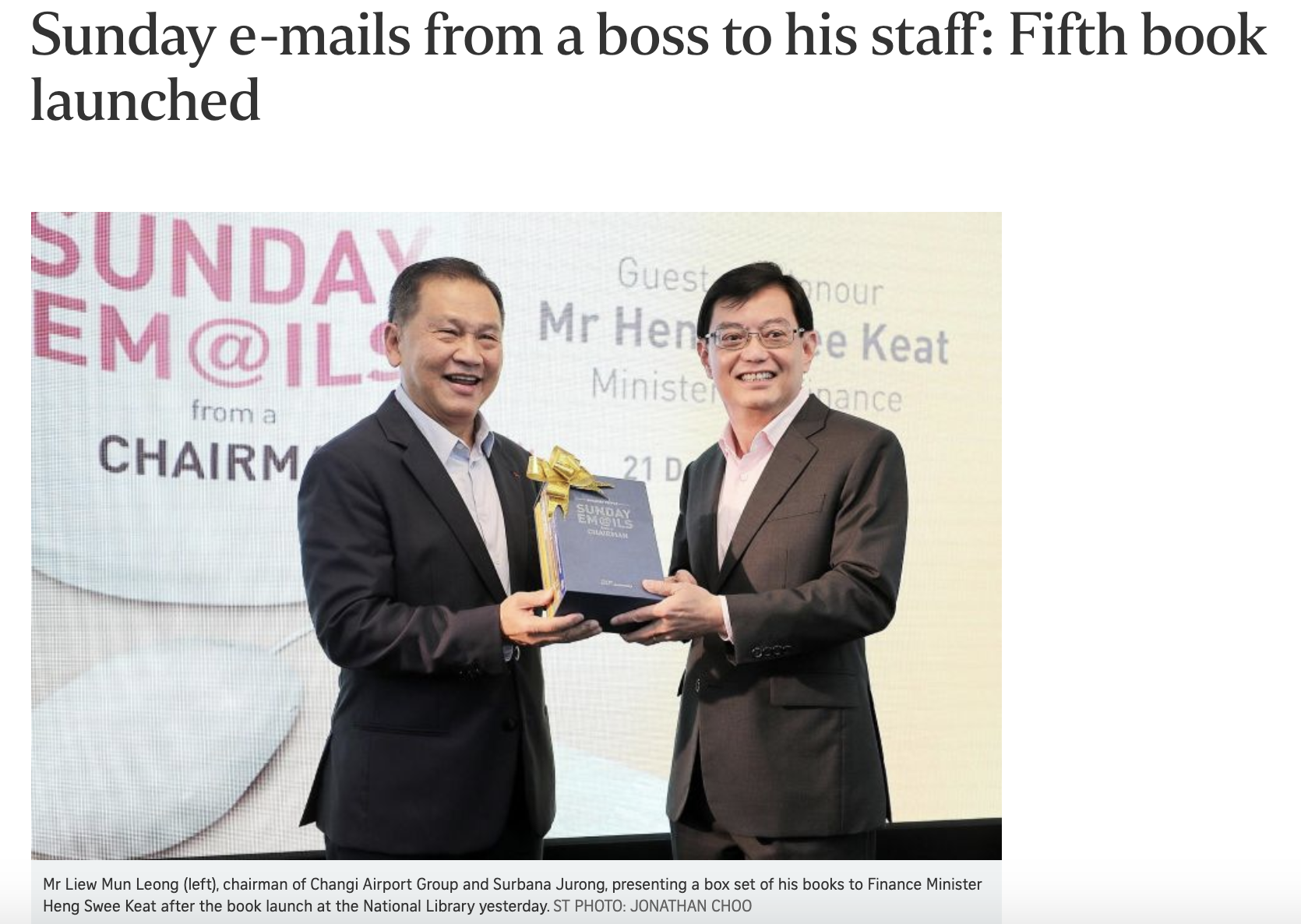This is the third special issue of We, The Citizens focused on Parti Liyani’s case and the questions it throws up about justice in Singapore. The first issue summed up the High Court judgment, while the second issue looked at access to justice in Singapore.
Liew Mun Leong runs in Singapore’s elite circles.
From 1996 to 2012, he was the founding president and CEO of CapitaLand, now one of the largest real estate groups in the region. He’s currently chairman of both Changi Airport Group and Surbana Jurong, an urban and infrastructure consultancy wholly-owned by state investment company Temasek Holdings.

(Praise of Liew Mun Leong by Ho Ching, CEO of state investment company Temasek Holdings.)
He’s been praised by Temasek’s CEO Ho Ching and feted in magazines like Tatler, where he’s included in a list of the most powerful and influential people in Singapore. According to his bio on the website of the NUS Business School — where’s he’s a Professor (Practice Track), he’s got a bunch of directorships under his belt, including at the Human Capital Leadership Institute, the Chinese Development Assistance Council, and the CapitaLand Hope Foundation, a philanthropic arm of CapitaLand set up to “further CapitaLand’s community development commitment to ‘Building People. Building Communities.’” For over 20 years, he sent emails every Sunday to his staff, sharing “lessons for management, leadership and self-development”.

(A screencap of a Straits Times article on Liew’s book launch, where Finance Minister Heng Swee Keat was guest-of-honour.)
In 2007, he was given an eye-watering bonus of $20.52 million by CapitaLand for his part in helping them achieve a record profit. In that same year, Parti Liyani, a domestic worker from Indonesia, began working for his family for a salary of $300 a month. Nine years later, he sacked her and then filed a police report against her for theft. On 4 September 2020 — after the case dragged on for about four years — the High Court acquitted Parti of all charges. She was also acquitted of a fifth charge, pertaining to items not claimed by the Liews, on 8 September.
In his written judgment, High Court Judge Chan Seng Onn said that it was reasonable to conclude that Liew had pre-emptively sacked Parti to stop her from reporting his family to the Ministry of Manpower for illegal deployment, after she was made to clean not just his home, but also his son’s office and home.
Illegal deployment
Under the Employment of Foreign Manpower Act, domestic workers should only perform household and domestic labour at the residential address registered on their work permits. (They’re only allowed to work elsewhere during the day if they’re caring for their employer’s children or the elderly.) They aren’t supposed to work anywhere else or in any other capacity, and moonlighting isn’t allowed.
On the Ministry of Manpower’s website, illegal deployment can be punished with a fine of up to $10,000. Employers could also be barred from hiring domestic workers in the future.
Following the High Court’s ruling, MOM released a statement acknowledging that Parti had lodged a complaint against her former employers for illegal deployment in October 2017. “The Ministry investigated her complaint and found that Mrs Liew deployed her to Mr Karl Liew’s house and office on different occasions,” they said.
“At the conclusion of the investigation in May 2018, the Ministry issued a caution to Mrs Liew and an advisory to Mr Karl Liew. The issuing of a caution, on these facts, is consistent with the approach taken in other similar cases.”
It’s not clear what the caution and advisory actually said. Before MOM’s statement, Parti had not been informed of this outcome.
What happens with illegal deployment cases?
Last night, the Ministry of Manpower revealed that, from 2017 to 2019, it dealt with an average of about 550 cases of illegal deployment a year. During that same period, it took action against an average of 155 employers a year. Every year, 60 employers are given advisory notices, while 80 are given cautions. About 16 employers were fined, amounts ranging from $3,300 to $24,000 (I’m not entirely sure how this works if the website said the maximum fine was $10,000).
A quarter of these cases were reported by the domestic workers themselves, while the rest were reported by third parties. An advisory notice, MOM says, is issued when illegal deployment isn’t “conclusively substantiated”. A caution, on the other hand, is akin to a stern warning from the police — which, as we know from a case Jolovan Wham brought to court, is “nothing more than an opinion of the relevant authority that the recipient has committed an offence, and [has] no legal effect on the recipient”.
Liew Mun Leong grabs attention because his wealth, which would allow him to hire an army of domestic workers, makes it even more outrageous that he chose to break the law and exploit Parti. But many employers in Singapore have done the same or similar to their workers.
Jaya Anil Kumar, a case manager at the Humanitarian Organisation for Migration Economics (HOME), the NGO that had supported Parti, says that, on average, about 25% of the domestic workers whose cases HOME has handled have reported being made to work at places that aren’t the ones registered on their work permit.
“Many of the cases that are lodged with MOM where the worker has complained of working outside her place of residence do not get taken up for investigations,” she says. If they are taken up for investigation, the worker will probably be offered the opportunity to change employers under the Temporary Job Scheme.
“From what we have observed, upon the conclusion of the case, the worker is usually not informed about the outcome of the case as a matter of course, and the amount of information that is told to the worker (if they ask) is rather discretionary.”
One thing to keep in mind, though, is that employers aren’t the only ones who can be penalised for illegal deployment; the workers themselves could be punished as well. “We have seen instances where domestic workers have been issued warning letters, or have been blacklisted for working at places beyond the place of residence,” Jaya says.
“From our observations, whether the worker is sanctioned depends on the duration and frequency the illegal deployment has been carried out, whether she was paid, and how long she has been working in Singapore.”
This possibility of getting punished themselves could dissuade domestic workers from reporting their employers for illegal deployment, even as they feel like they might have little choice but do what they’re told.
“MOM should be aware that workers often agree to partake in such activities (even if they know it is illegal) as they are afraid of being scolded, or terminated, if they refuse, as there exists an unequal balance of power between the employer and domestic worker.”
Feel free to share this post!
You can support my work and make sure you get all issues of the newsletter emailed to you by becoming a Milo Peng Funder:

